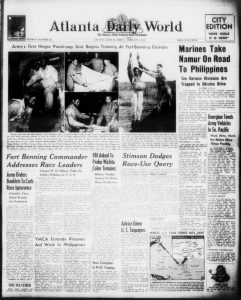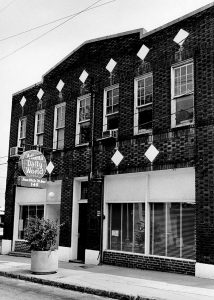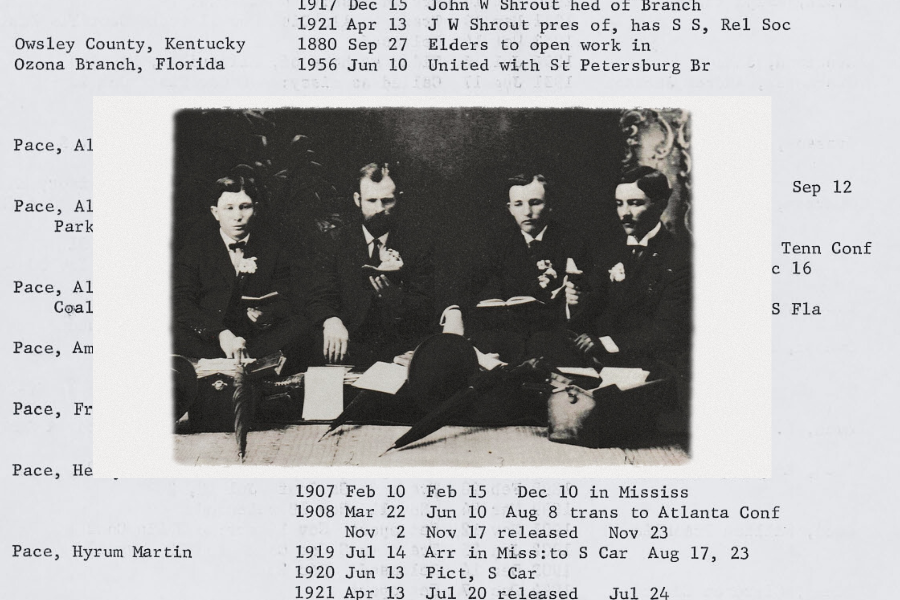Read All About It – The Atlanta Daily World
History of the Atlanta Daily World Newspaper
By Monica El-Amin, African American History Coordinator
The Atlanta Daily World (ADW) was founded in 1928 by William Alexander Scott II. By 1932 it became the “nation’s only daily colored newspaper.” While the ADW was not the first African American newspaper in the South, it would become one of the most notable Black owned newspapers across the country. The newspaper began as a weekly publication with a goal similar to black newspapers before it: to change the narrative of Black representation in the media. Born within the societal norms of Jim Crow, the newspaper became known for advocating for change and promoting Black American culture.
The 1920s were a time of racial tension and transformation in the United States. The decade witnessed the resurgence of the Ku Klux Klan, an increase in the passage of Jim Crow laws, and an increase in segregation. This created a socio-political environment where Black Americans struggled through social death, lack of basic rights, and maltreatment. The ADW served as a communication bridge between the Black community in Atlanta and beyond to connect around these issues. The newspaper would then expand the Black American connection to national global movements like the Harlem Renaissance and Pan-Africanism.
One of the main reasons the ADW existed was to give fair, in-depth coverage of issues often ignored by white-owned newspapers. It focused on everything from local news to national stories about racial inequality, segregation, and the Civil Rights Movement. The paper was a platform for Black Atlantans, reflecting their everyday hardships and successes while fighting systematic racism, lack of educational opportunities, economic stagnation, and political representation.
The ADW became a major ally of the Civil Rights Movement during the 1950s and 1960s. It kept Black Atlantans abreast of the national fights for desegregation, voting rights, and economic equality. The paper reported on local activists and major leaders of the movement like Dr. Martin Luther King Jr., an Atlanta native. The ADW’s coverage of significant movements such as the 1963 March on Washington, raised awareness of the civil rights struggle, and provided a platform for Black leaders.
Beyond civil rights, the ADW focused on educational and economic freedom for Black Americans. Highlights of Black businesses and entrepreneurs helped to boost the power behind the concept of the black dollar. This would promote growth and sustain the local economy. Within the education sector, there was a push for better schools and more opportunities for Black children to thrive. By actively supporting the Black community’s need for education reform and economic self-sufficiency, the Atlanta Daily World played a major role in establishing a more independent Black community.
The ADW has been at the forefront of many movements in civil rights history. One of the major stories covered was the Scottsboro Boys Trial in 1931. Nine black teens were wrongfully accused of sexually assaulting two white women from Alabama, and the case became a national scandal. The ADW vehemently demanded justice for the teens, using their platform to rally support for the defense and spotlight the racial injustice at the core of the case. At the time, cases like these were riveting, as the lives of these boys were in the hands of the criminal justice system.”
In 1961, Atlanta Public Schools began the desegregation of their school system. The ADW provided comprehensive reporting on the legal and social battles surrounding the move while highlighting the courage of Black American students in the face of resistance from segregationists. The paper’s coverage of the Black students who integrated the University of Georgia, Charlayne Hunter and Hamilton Holmes, is another prime example of the ADW’s commitment to highlight the struggle of education equality during the Civil Rights Movements
Additionally, the rise of the Black Power Movement in the 1960s and 1970s was another critical subject for the ADW. Organizations like the Black Panther Party rose in prominence, and the ADW covered stories on their activities, local chapters, and efforts to dismantle police brutality. This reflected the changing views on activism in the Black American community with a shift from non-violent protests to more assertive demands for change. No longer were the new civil rights leaders using non-violent tactics; they were asserting change with Black pride and self-defense.
The Atlanta Daily World was significant for various reasons, but it counteracted the bias often seen in white-owned mainstream newspapers. During a period where Black Americans were regularly misrepresented in the media or wholly omitted from the narrative, the ADW, like other black newspapers of the time, filled a gap. This granted Black Americans access to their struggles and triumphs without prejudice.
Moreover, the ADW’s advocating for communal revolution and lobbying was fundamental. Through their coverage of the civil rights movement, protests, and local activism, the paper greatly influenced public perception and provided resources for community nonpartisanship. It was a central hub for activists to share their messages, ideas and gain support for their causes. As a result, the ADW contributed heavily to the conversation surrounding racial equality, assertively publishing articles covering key legal and social reforms like desegregation and voting rights.
The ADW especially played a pivotal role in community building. By reporting on local education systems, Black businesses, and health concerns, the newspaper became a necessary source of information for Black Americans needed to improve their lives. It fostered a sense of solidarity and purpose while keeping their readers informed and connecting them during a period of social and political shifts.
The Atlanta Daily World is a landmark accomplishment in Black American journalism. Through its dedication to reporting on the nuanced experience of the Black community, the ADW aided in revolutionizing the urgency of societal shifts, advocating for equality, and empowering Black communities. The newspaper’s influence is perceived not only through their coverage of the Civil Rights Movement and significant events but also through the continued work of Black media outlets today. The ADW is an indication of the power of the press to mold public discourse, champion social justice, and uplift marginalized voices.







